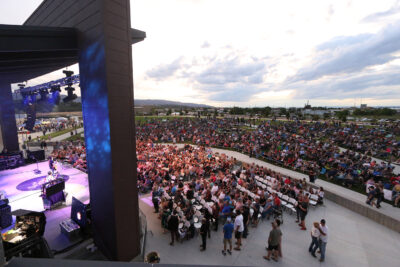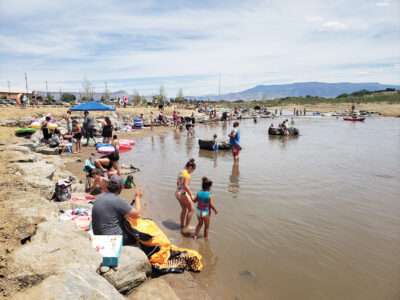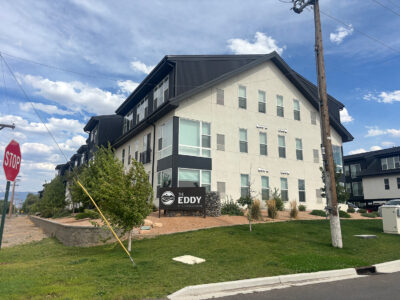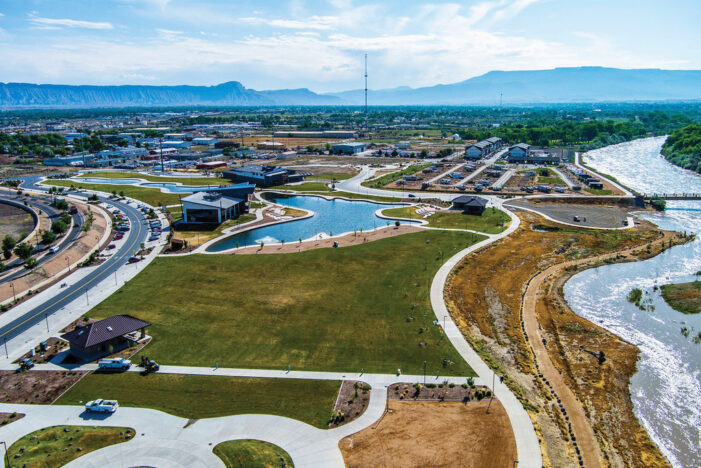Brandon Leuallen, The Business Times
The Las Colonias Riverfront Zip Adventures zip line, once billed as a signature attraction of Grand Junction’s downtown riverfront development, closed without notice partway through 2024. While the attraction had been covered in previous reporting about its opening, its closure wasn’t made public until a recent Business Times article drew questions from the community about the prospects and current status of the broader Las Colonias development.
In a July 28 interview with The Business Times, Curtis Englehart, executive director of the Grand Junction Economic Partnership, said that while the zip line isn’t operating, the broader redevelopment effort continues to progress, propelled by new strategies and shifting priorities.
“I think sometimes it can be difficult from a community perspective if you don’t see a new building going up every six months,” he said. “But the process alone takes a lot of time and a lot of money on the developer side to make it happen.”
Englehart then pointed to a map of the park and surrounding area, noting parcels already developed, others sold or leased and slated for construction in the near future, and additional sites with strong development prospects in the pipeline.
Englehart also answered questions about challenges and successes that the development has faced over the years and the different solutions that have been applied.
The 99-Year Lease Shift

One of the earliest and most critical challenges for the Las Colonias business park was that the City Charter limited land leases to just 25 years, making banks reluctant to finance construction on land they didn’t own.
To remedy this, Measure 2B was placed on the November 2019 ballot, asking voters to allow up to 99-year leases, specifically for the Las Colonias Business Park.
“From a financing standpoint, 99 years was a lot easier to finance versus 25,” Englehart said.
The amendment applied only to the Las Colonias Business Park, making long-term ground leases more appealing and laying the groundwork for future development. According to GJEP, 99-year leases allow banks to view projects as nearly certain to pay off before the lease even ends.
Despite the change, Englehart said development significantly slowed in 2020 as the COVID-19 pandemic disrupted investment, construction timelines and tenant recruitment.
From Outdoor-Only to Multi-Industry
Originally, the business park targeted only certain types of outdoor and tech companies. Under those strict rules, some local businesses and others outside the outdoor sector may have been discouraged from applying or had even been turned down.
RockyMounts, an early success in the outdoor manufacturing sector, later became a black eye when it closed its Las Colonias location and moved out. The structure remains under RockyMounts’ ownership, and the company is still paying the land lease.
“If there’s an appetite to fill that from the current building owner, we will absolutely fill it,” Englehart said.
Today, the area is zoned as Planned Development, opening the doors to Class A manufacturing, office buildings and retail spaces. That flexibility has turned into a major selling point.
“It’s pretty flexible on what we can put down there,” Englehart said. “That flexibility has been key to moving forward.”

Adding to the appeal, Englehart said Las Colonias sits within a federal Opportunity Zone, offering investors tax incentives, such as deferring and potentially eliminating capital-gains taxes if investments are held for 10-plus years.
The original more strict rules were highlighted in a Daily Sentinel article titled “Tale of two cities’ Projects” on March 13, 2022.
The shift to multi-industry began in earnest after Englehart joined GJEP in August 2022.
“We did make that shift to more of, ‘What business is going to benefit from being on the riverfront and vice versa?’” Englehart said. “That’s when we really stepped back and took more of an approach of, let’s make this a multi-industrial project.”
Englehart said the city and GJEP use ground leases creatively, now offering more flexible lot sizes to accommodate different-sized businesses, as well as reduced rates, zero interest and no money down, while also requiring development to begin within 12 months.
Businesses (West to East)
Since the park was developed, here are some of the developments that have taken place so far, along with others that are planned or expected in the near future:
West of the amphitheater at Las Colonias, the Colorado Weedery sits alongside WestCo Brewing, formerly Edgewater Brewery, which is undergoing renovations. Townhomes and the Struthers Residences provide nearby housing, and Englehart said additional apartments are under construction to the north of the amphitheater across the riverside parkway.
The restaurant and retail section east of the amphitheater, between the dog park and the festival area, is intended to serve locals, park visitors, bike path users and employees of companies in the business park.
One key project underway is the OakStar Bank building, which will include restaurant space on the ground floor, a community boardroom with a large deck overlooking the bike path and river park, and OakStar offices occupying part of the first and second floors. Designed to house multiple businesses, the building is attracting interest.
During a tour, OakStar Bank Grand Junction Market President Clay Tufly said a coffee shop is considering the restaurant space, with other possibilities expected as completion approaches. The retail and restaurant area sits adjacent to the festival grounds, which host large community events.
The business park stretching north around the Butterfly Ponds offers space for offices and light manufacturing. Englehart pointed to Site B and Site C north of the Bonsai building, saying, “Those sites have serious prospects in the pipeline.”

One site on the north of the business park at the entrance off the Riverside Parkway is sold and scheduled to be developed into two manufacturing facilities. Englehart said Site I, just east of RockyMounts, is also being leased and developed next. Sights F, G, L, M and N are also listed on the map and undeveloped.
Grand Junction Adventures, a rafting and paddleboard rental company located near the boat ramp, offers rentals and guided trips, according to its website. The business is open on weekends and provides rentals by appointment during the week, taking advantage of its close proximity to the river.
Stephanie Copeland, whose team developed and manages Camp Eddy and The Eddy apartments, called the location an “ideal opportunity” to bring housing and lodging to the riverfront after the city and Las Colonias Development Corporation had “laid the foundation” for redevelopment. Copeland said Camp Eddy is “pretty full.”
The Eddy apartments have been “almost 100 percent occupied … since day one,” Copeland said, while the campground, which opened in 2022, offers nightly rentals in Airstreams and tiny homes along the river. Campers share a clubhouse with apartment residents, complete with river views, grilling space and a fireplace.
Hospitality takes longer to stabilize, but Copeland said occupancy has increased every year since opening, with bookings up about 20 percent this year. Guests often use the Riverfront Trail, float the river “for the views … the proximity to downtown, and… to the trails.”
History of the park
Grand Junction Parks and Recreation Director Ken Sherbenou said the site is the culmination of years of riverfront cleanup and redevelopment efforts.
“It goes back to leaders at the state and local level working to clean up those sites and turn them into public assets,” Sherbenou said. “The vision was always to realize the full potential of the river, connect it with trails and keep expanding.”
According to a Grand Junction Economic Partnership announcement, the city officially broke ground on Las Colonias Park in March 2018.
Sherbenou said amenities like the amphitheater, River Park, dog park and boat ramp are major draws for locals and out-of-town visitors. The Riverfront Trail now stretches from Las Colonias all the way west to Loma and east toward Palisade, with work underway to close the gap between the Eagle Rim Bridge and 29 Road on the north side of the river
Parks & Recreation Amenities (West to East)
According to Sherbenou, Las Colonias Park is one of three regional parks in Grand Junction, designed to serve not just the city’s residents but visitors from across the Western Slope.
Amphitheater – The amphitheater serves as one of the park’s signature features and a key economic driver for nearby businesses. It is maintained by the city but operated in partnership with Oak View Group, which handles talent booking, concessions and security.
“We handle operations, we handle cleaning, we provide event staff,” Sherbenou said. “Security is provided by Oak View Group, and they also manage ticketed events.
“Some of the larger concerts bring in about 5,000 people, which is a big crowd for GJ.”
Dog Park – East of the amphitheater, the four-section dog park is rotated regularly to protect the turf and ensure user safety. “We’re really careful about making sure we’re protecting the health of the turf, so it stays in shape for users,” Sherbenou said.
Festival Area – Located between the OakStar Bank construction site and the butterfly ponds, Sherbenou said the festival area is designed to accommodate events like the River Fest, water Water Festival and others with built-in infrastructure for food trucks, staging and other amenities.
River Park (Formerly “Lazy River”) – Sherbenou said the city now intentionally avoids using the original “lazy river” name to prevent misconceptions. “It’s still the river,” he said. “Even though it’s a side channel with slower water, it’s still a natural environment, not like a lazy river you’d see at a rec center.”
The River Park typically opens at the end of May, with conditions monitored through a flag system. A red flag warns of high flows when tubes and small inflatables should not be used, while a yellow flag signals safer conditions.
Sherbenou said when the park is running during peak season, it’s a popular attraction.
“After the river drops in July, depending on runoff, the lower section is still open, but it’s not the same experience,” he said. “While people still use it later in the year, many of them begin to move over to the Dos Rios splash pad to cool off.”
Boat Ramp – Renovated as part of the regional park’s construction, the boat ramp is a major launch point for river recreation.
“The boat ramp parking lot is packed on the weekends,” Sherbenou said, adding that parking often overflows into nearby areas when river use is at its peak.
Butterfly Ponds – Sherbenou said the ponds serve as a gathering space and a place to paddleboard and do yoga. The ponds also host the “Lights at Night” event each October.
Riverfront Trail and Eagle Rim Bridge – The trail connects Las Colonias to neighborhoods on the north side of the river.
“It’s a huge part of the regional transportation infrastructure,” Sherbenou said.
Work is ongoing to close the last mile-and-a-half gap to 29 Road.
Financing Las Colonias
Grand Junction Parks & Recreation Director Ken Sherbenou confirmed the amphitheater cost $3.8 million, half funded by a Department of Local Affairs grant and the rest by the city, with Oak View Group managing bookings, concessions and security.
The River Park, originally dubbed the “lazy river,” totaled $1.2 million, drawing from grants including $350,000 from Great Outdoors Colorado and $150,000 from the Colorado Water Conservation Board, with the city covering the remaining $600,000. The boat ramp was financed separately.
Other financing of the park that was established under former Grand Junction City Manager Greg Caton drew criticism.
Former Grand Junction City Council member Dennis Simpson unsuccessfully sued to make the Las Colonias Development Corporation subject to open records laws in 2021.
Duncan McArthur, another former city council member, voted against the contract for zip-line builder Bonsai Design. In an op-ed in the Daily Sentinel, he questioned the Downtown Development Authority’s use of TABOR-exempt debt, allowing millions to be spent without a public vote, and a $1 million subsidy to Bonsai without city council reviewing financials. McArthur noted the only way to sell the properties would be by a vote of the people.
New Grand Junction Mayor Cody Kennedy, selected in June 2025, said earlier agreements, some dating back to 2017, lacked accountability. The priority now, he added, is moving forward.
“Hindsight’s always 20/20,” Kennedy said. “The next best thing is learning from experience as you move forward. Long term, we are gonna have a vibrant riverfront from Las Colonias to Dos Rios. As the park gets built out and additional housing is going to get built down there … it will be good.”

